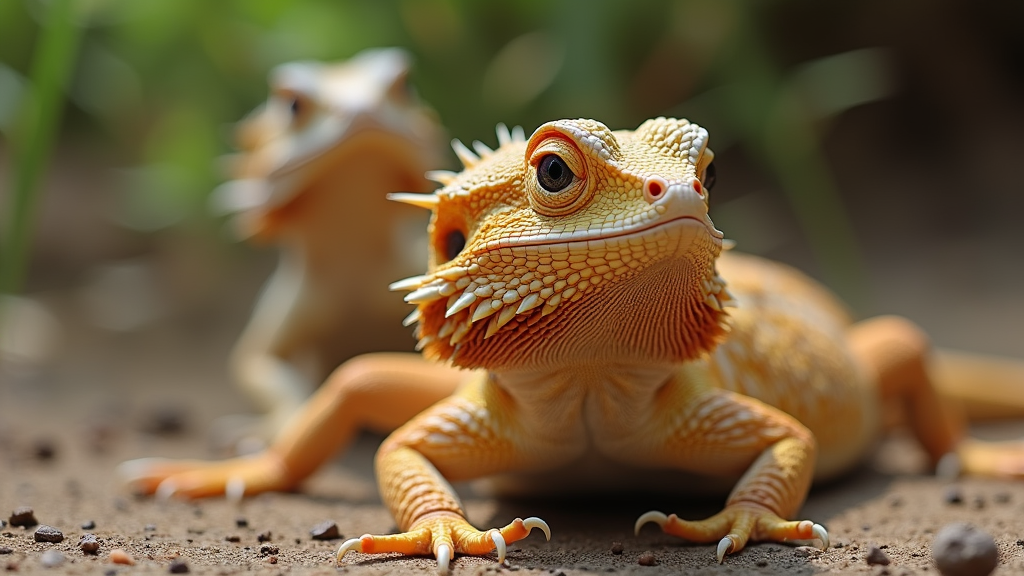Metabolic Bone Disease (MBD) in bearded dragons is a condition that every responsible reptile owner should be aware of. This debilitating yet preventable disease can have severe consequences if not properly managed. With years of experience owning numerous exotic pets, including bearded dragons, I’ve seen first-hand how crucial proper care is in maintaining your dragon’s health. This blog post will delve into what MBD is, how to recognise it, and most importantly, how to prevent it.
What is Metabolic Bone Disease?
Metabolic Bone Disease is an umbrella term encompassing disorders that negatively impact bone structure and function due to nutritional and environmental deficiencies. In bearded dragons, MBD is most often caused by inadequate calcium levels, improper UVB lighting, and poor diet.
Causes of Metabolic Bone Disease
Knowing what causes MBD is vital in preventing it. Here are the main factors:
Calcium Deficiency
Calcium is essential for strong bones, muscle function, and overall metabolic processes. Bearded dragons require a balanced diet rich in calcium, ideally through gut-loaded insects and calcium supplements.
Improper UVB Lighting
Proper UVB lighting enables bearded dragons to synthesise vitamin D3, which aids in calcium absorption. Without adequate UVB light, calcium absorption is compromised, leading to MBD.
Poor Diet
A balanced diet that includes vegetables, fruits, and protein is crucial. Failing to provide a diet with the appropriate nutrients can lead to MBD and other health issues.
Recognising the Symptoms
Early detection of Metabolic Bone Disease can make a significant difference in the prognosis for your bearded dragon.
Physical Symptoms
Look out for physical indicators of MBD such as:
- Soft or swollen jaws
- Lethargy and weakness
- Tremors and twitching limbs
- Swollen limbs or spine
- Difficulty walking or moving
Behavioural Symptoms
Behavioural changes can also signal MBD:
- Reluctance to move or eat
- Lack of coordination
- Sudden aggression or irritability
Case Study: A Personal Encounter
One of my bearded dragons, Spike, began showing signs of weakness and lethargy a few years ago. Close observation and a prompt visit to the vet revealed early-stage MBD. With timely intervention, including UVB light adjustments and calcium supplements, Spike made a full recovery. This experience underscored the importance of vigilance and immediate action.
Preventing Metabolic Bone Disease
Prevention is always better than cure. Here are key steps to prevent MBD in your bearded dragon.
Diet and Nutrition
- Variety: Incorporate a variety of vegetables, fruits, and insects.
- Supplements: Regularly use calcium and vitamin D3 supplements. Check out these supplement options.
- Hydration: Ensure constant access to fresh water.
Proper UVB Lighting
- UVB Bulbs: Use high-quality UVB bulbs designed for reptiles.
- Placement: Position the bulbs at the appropriate distance from the basking spot to maximise exposure.
- Duration: Ensure your dragon receives 10-12 hours of UVB lighting each day.
For more details, you can read our comprehensive guide on bearded dragon health here.
Habitat and Environment
- Temperature: Use a combination of basking and cooler areas to maintain the proper temperature gradient within the enclosure.
- Substrate: Avoid loose substrates like sand that can lead to impaction and nutrient blocks. Opt for safe alternatives like reptile carpet or tiles.
Regular Check-ups
Regular veterinary check-ups are essential for early detection of potential health issues, including MBD.
Conclusion
Metabolic Bone Disease is a serious but preventable condition in bearded dragons. By understanding the causes, recognising the symptoms, and implementing essential preventive measures, you can ensure a healthy and thriving dragon. Remember, the key lies in maintaining the right dietary balance, providing proper UVB lighting, and creating an optimal habitat.
If you suspect your bearded dragon might have MBD, consult a vet immediately for a proper diagnosis and treatment plan. A little care and attention significantly contribute to your pet’s well-being, offering them a happier and healthier life.
Meta Description for SEO
“Learn how to recognise, prevent, and treat Metabolic Bone Disease (MBD) in bearded dragons with expert advice on diet, lighting, and habitat from an experienced exotic pet owner.”
Additional Resources
For more information on caring for bearded dragons, check out our other posts on diet tips and habitat setup. You can also visit reputable sites like Vetstream for veterinary advice.
Feel free to comment below with any questions or share your experiences! Don’t forget to subscribe for more expert insights into caring for your exotic pets.
By investing in knowledge and proper care, you’ll ensure your bearded dragon lives a long, healthy life. Happy herping!

